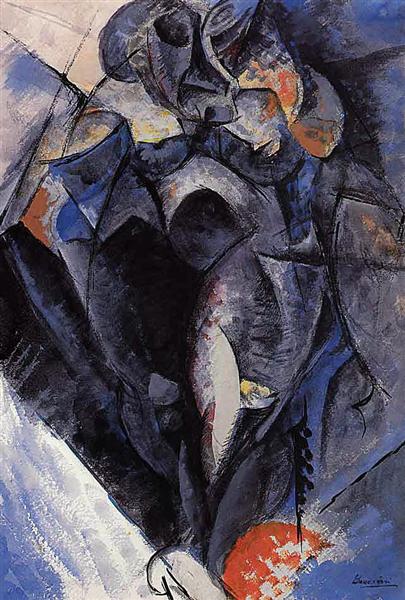SABOTAGE
By:
May 25, 2022
A series dedicated to poems, published c. 1900–1935, the Radium Age sf-adjacent themes of which include: dystopia and utopia, far-out mathematics and the fourth dimension, Afro-futurism, catastrophe, future war, new technologies, scientific breakthrough, dehumanization, cosmic awe, disenchantment and unseen forces, unknowable aliens and singularity. Research and selection by Joshua Glenn; thematic index here.

In “Sabotage,” a 1912 poem in blank verse, Randolph Bourne gives us the lyrics to the first-ever heavy metal power ballad.
I.
Into your machines, O my masters, you
have knotted and kneaded our lives.
You have caught our early dawn and
streaked it over with murky clouds of
soot,
You have staled the freshness of our
morning, and dried the dew of our
limpid misty youth with the inexorable
blatant roaring mechanics of your
routine.
You have taken our flesh and our heart’s
blood, and with the cunning artifice of
the sculptor have plastered and daubed
us into your metal looms.
Our ambitions, our desires, our loves and
gloomy fears, you have drawn out one
by one into fine-spun threads, and tied
our souls to your clashing wheels and
whirling spindles,
And little pieces of our lives stick quivering
to all their joints and frames—
Lost dead strains of our effort, lost and
dead to us but still quick and alive in the
subtlety of our adaptation,
Quick and alive in the skill of our muscles
which rivets us even more tightly to the
steel whose prisoners we are.
From the mystical touch of our labor, from
the blood which we have poured so
freely through their creaking metal
veins,
Your machines have received life, received
thought, have created;
We have been to them as gods and have
breathed life into their dull clay.
But base and drabbled gods—
For over us, O my masters, turns ever your
iron wheel of the world, the wheel of
ownership, the wheel of exploitation,
And we who breathed the soul of life are in
our turn drained of our soul of life,
As the machines spring into creation, we
living bodies deaden—deaden—deaden
—
Our muscles, tense, quick, sure, become
the lifeless nerves, the deeply-
channelled reflex
Through which the great thought and
purpose of the machine expresses its
conscious self.
We are the cogs, we are the levers, we are
the machines, at which these metal
monsters work.
We are their food, their body’s
nourishment,
We are one flesh with them — tangled,
coiled, metabolized, inextricably
knotted,
Into your machines, O my masters, you
have knitted and kneaded our lives.
II.
But see! now as the dim confused cry of
revolt sounds far without the factory
walls,
As we strain to hear the wild sweet cruel
words that bid us cease from labor —
Slowly ebbs back the blood into our veins,
ebbs back from the vital triumphant
lusty machines that have long
dominated us.
We are men again, we strain to tear
ourselves from the suffocating
embrace,
We wrench ourselves from the fusion
which has killed us.
From this blended body we strive to tear
our bodies, from this tangled soul we
strive to tear our souls.
And in the wrenchings what veins of the
machine are opened! what sinews tear!
what tender nerves are ripped asunder!
We wrestle and sweat to escape, and in the
mad struggle what of the firmest tissues
are broken! what of the strongest fibres
are rent!
See! this bolt! it comes away with me — it is
part of me —
I am ground into it, with the grindings of
winter daybreaks and feverish August
afternoons.
See! this handle! it cleaves to me as I tear
myself away — it is a part of me —
It is that have given it life — it loves me it
pulls and tears after me, and what if in
its pulling it tears and kills the
vital bowels of the machine.
See! we workers and our machines, we are
all of one wondrous fabric — one
thread of us do you pull, and the whole
great sheet unravels,
We cannot help, O my masters; it was not
we that knit us into
the warp and woof of your machines —
It was not we that drained off our power
and our passion into the cold lifeless
steel, and thrust the remorseless drive
and clank into our own sinews and
muscles,
It was not we that kneaded our lives into
the brick and steel.
What if in our wrenchings old moralities
crumble, and the “Thou Shalt Nots” of
our masters become as fine powder?
It was not we that stood on Sinai, or
wrought the iron lock of ownership.
Curse yourselves, O my masters, as we pull
and strain, and the great domineering
machines lie wounded and stricken at
our feet.
Curse yourselves, but in us dawns the mad
hope, the wild certainty of the day when
we both shall live!
The day when new free sweet moralities
shall arise, and in the healing touch of
brotherhood, the machines — into
which, O my masters, you have knotted
and kneaded our lives — shall be, not
flesh of our body, but docile nerves and
sinews of our will!
RADIUM AGE PROTO-SF POETRY: H.D.’s STARS WHEEL IN PURPLE | Clark Ashton Smith’s FROM PLANET UNTO PLANET WHIRLED | Anonymous’s ASTRONOMIC JOSH | Rudyard Kipling’s THE SECRET OF THE MACHINES | Randolph Bourne’s SABOTAGE | Stephen Spender’s THE PYLONS | Ford Madox Ford’s GREY MATTER | W.E. Henley’s A SONG OF SPEED | H.L. Mencken’s A BALLAD OF LOOKING | George Sterling’s THE TESTIMONY OF THE SUNS | Vachel Lindsay’s THE SCIENTIFIC ASPIRATION | Thomas Hardy’s EPITAPH FOR G.K. CHESTERTON | Archibald MacLeish’s EINSTEIN | Thomas Thornely’s THE ATOM | more to come.
